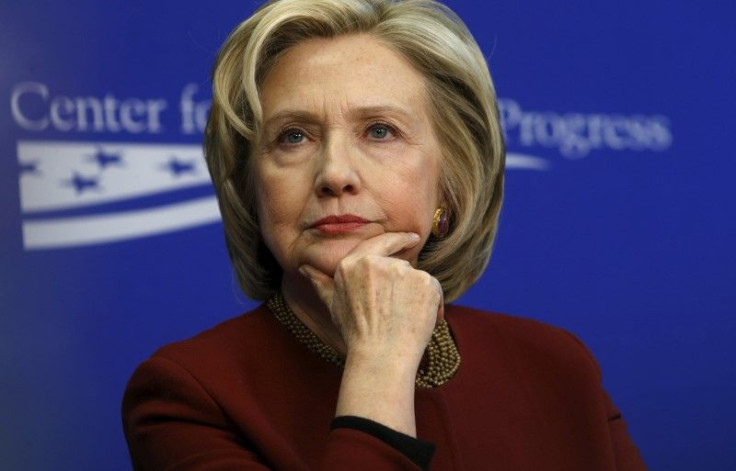Hillary Clinton 2016: China Weighs In On Presidential Campaign

After months of speculation and anticipation, Hillary Clinton formally announced her candidacy to run for president of the United States. While Democrats and Republicans had a lot to say after her announcement Sunday, across the globe a powerful population of Chinese netizens have also been weighing in on the new Democratic candidate, with many having only bad things to say.
On Weibo, China’s hugely popular microblog service, comments and posts about the beginning of Clinton’s campaign began rolling in the hours after the announcement, with the most popular comments sharing the same acerbic sentiments.
“Always hated her,” read one post by China’s Central Television. Most of the comments seemed personal, and in some cases sexist, not noting where the hatred was coming from. “Not this old witch,” another chimed in, while others used other expletives to describe her. One posting went so far as to call her a “female version of Hitler.”
Others pointed to what they perceive as Clinton’s anti-China position. “If she came to power, US-China relations would be jeopardized,” read one post. “[Chinese] are really going to fight if she’s elected.” Though most netizens did not specify what about Clinton’s politics threatened China, her past involvement in human rights activism likely does not help.
Clinton has been vocal about China’s decision-making when it comes to domestic and international human rights abuses. In 2008, then-Sen. Clinton made her stance on the detention of Tibetan dissidents in China clear to the government and people, calling for Chinese authorities on the ground to exercise restraint. She also urged President Bush to boycott Beijing’s 2008 Summer Olympics opening ceremony in protest. “The violent clashes in Tibet and the failure of the Chinese government to use its full leverage with Sudan to stop the genocide in Darfur are opportunities for presidential leadership,” she said at the time, according to the Los Angeles Times. “These events underscore why I believe the Bush administration has been wrong to downplay human rights in its policy toward China.”
Earlier this April, Clinton tweeted about the treatment of five Chinese feminist activists who were detained by Chinese authorities during a women’s rights protest (and later released on April 14). “The detention of women’s activists in #China must end. This is inexcusable,” she wrote, linking to a story about the women.
But Clinton’s hard line against China is hardly unique. During the 2012 election, China was also watching when President Obama and Republican candidate Mitt Romney went head-to-head in a debate dedicated to foreign policy. Obama had used strong rhetoric when it came to dealing with China, which struck many Chinese as surprising. “Obama is taking the same position as Romney to bring down the Chinese,” Chinese bloggers said at the time. Romney did not hold back either, saying he would “crack down on China when they cheat,” even promising to “label China a currency manipulator” on the first day of presidency.
However, more concerning than Clinton’s human rights position challenging China is actually a problem brewing offshore. Foreign Policy reported that China’s hatred for Clinton is the result of her policies during her tenure as secretary of state in 2009 to 2013. The report says that netizens credit Clinton with being a big supporter of the U.S. military “Asia pivot” in the region that has contributed to the tension in the South China Sea over competing territorial claims between China and America’s Southeast Asian allies. In 2013, China’s state-run Global Times said Clinton was “the most hated U.S. political figure” among Chinese netizens, following her departure from the State Department.
Meanwhile, Clinton’s potential opponents have begun making their own impressions on the Chinese.
Since George W. Bush was well-liked by China’s public, putting younger brother Jeb Bush, former governor of Florida and suspected candidate, in China’s good graces. “Bush made some mistakes in foreign policy, especially with Iraq, but for the Chinese, he had been a true friend,” Mao Baoshu, a retired nuclear specialist told the Los Angeles Times in 2009. Today the Chinese still call the Bush politicians friends. “China is an old friend of the Bush family, the people of China should support the Bush family,” a netizen commented on a posting about Clinton. Additionally, according to Foreign Policy, presidential hopeful Rand Paul has also piqued the interest of some Chinese intellectuals, who compared his economic policies to those of revered Chinese leader Deng Xiaoping.
While the opinions of 500 million Chinese netizens can be hard to ignore, at the end of the day, the voices of Chinese netizens still don’t translate to votes and won’t really matter for Clinton’s campaign.
© Copyright IBTimes 2025. All rights reserved.






















